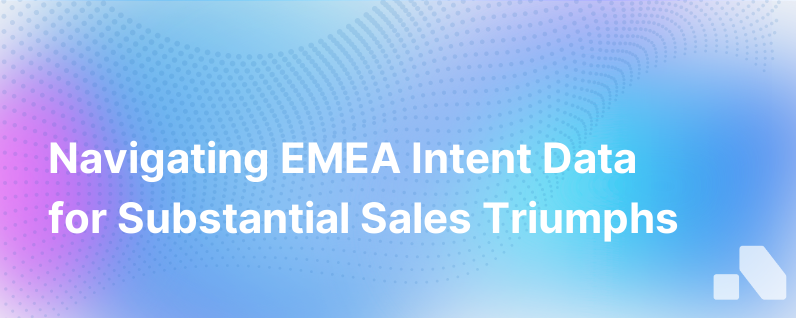
In the ever-evolving landscape of B2B marketing, understanding and harnessing intent data has become a cornerstone for companies eager to pinpoint and engage their target audience with precision. The emphasis on intent data is particularly pronounced within the EMEA (Europe, the Middle East, and Africa) region, known for its rich tapestry of cultures, languages, and regulatory frameworks. While these factors present unique challenges, savvy marketers who navigate these waters deftly stand to reap enormous rewards.
Intent Data – A Primer
Intent data comprises digital breadcrumbs that potential customers leave behind when they interact online. These interactions may include content downloads, search queries, and website visits. Tracking this digital activity unveils valuable insights into a prospect's interests and purchase intentions. By analyzing these signals, marketers and sales teams can deliver more targeted and timely outreach, fostering better engagement and conversion rates.
The EMEA Challenge
In the EMEA region, deploying intent data effectively is akin to conducting a symphony in a room of a hundred different instruments, each with distinct sounds to contribute to the melody. The variety might be beautiful, but it also requires a nuanced understanding of each instrument. Here are the 'instruments' that B2B marketers tuning into the EMEA markets must finesse:
Diverse Market Dynamics
EMEA spans across vast territories encompassing various economies, from well-established markets to burgeoning ones. The purchasing behavior in Germany might differ starkly from that in South Africa, so a one-size-fits-all approach to intent data is unlikely to yield optimal outcomes. Marketers must adapt their strategies to the intricacies of each country's market tendencies.
Cultural Nuances
With a multitude of languages and cultures, the interpretation of intent signals varies. A surge in content consumption may indicate buying readiness in one region, whereas, in another, it could simply signify early research. Understanding these cultural nuances plays a vital role in accurately assessing and leveraging intent data.
Regulatory Landscapes
Stringent regulations, such as the GDPR (General Data Protection Regulation), govern data privacy in the EMEA region, particularly in the EU. Marketers must strategize within these boundaries to avoid penalties and maintain trust among prospects and customers.
Overcoming Obstacles: Strategies for EMEA Intent Data
Despite these challenges, the potential rewards for effectively harnessing intent data in EMEA are vast. Here are strategies to capitalize on it:
Tailored Regional Strategies
A successful approach to intent data requires an intimate understanding of regional differences. Marketers should develop tailored strategies for varying geographical territories within EMEA, factoring in local market behavior, purchasing power, and business etiquette.
Cultural Intelligence
Marketers need to immerse themselves in the cultural subtleties that shape the digital footprint of their target audience. This includes grasping the significance of language, colloquialisms, and the symbolic value of interactions. Employing regional marketing professionals can provide on-the-ground insights that enrich intent data analysis.
Compliant Data Practices
Navigating the complex regulatory frameworks in EMEA is non-negotiable. Using intent data means ensuring that all data collection, processing, and storage practices are transparent and compliant with local laws. This also involves respecting the customer's right to privacy and data protection, which ultimately builds trust.
Technological Integration
Advanced technologies, such as AI and machine learning, can process vast amounts of intent data efficiently. These technologies can discern consumer patterns, predict behaviors, and personalize outreach at scale. Investing in such tools will enable marketers to tackle the vast EMEA market more effectively.
Partnering for Success
EMEA marketers can greatly benefit from partnering with local data providers and platforms adept in interpreting regional intents. These partners often offer enriched datasets and analytics tailored to the nuances of the EMEA market.
Ongoing Learning and Adaptation
The EMEA market, with its dynamic and evolving character, necessitates a commitment to continuous learning and adaptation. Businesses need to stay abreast of market changes, regulatory updates, and shifts in consumer behavior to keep their intent data strategies relevant.
Big Rewards Await
Those who are successful in mastering intent data in the EMEA market stand to gain significantly in several ways:
Enhanced Lead Quality
Intent data equips marketers with the ability to sift through the noise and focus on leads who demonstrate a genuine interest in their offerings, thereby enhancing lead quality and improving sales efficiency.
Competitive Edge
In an information-rich age, the ability to act on intent signals can be the difference between securing a deal or losing it to a competitor. Real-time analysis of intent data ensures you are always a step ahead.
Reduced Customer Acquisition Costs
By targeting only those who are most likely to convert, businesses can reduce customer acquisition costs. Focused marketing efforts translate into better resource allocation and increased ROI.
Personalized Customer Engagement
With insights drawn from intent data, businesses can tailor their communication to resonate with prospects on a personal level, fostering stronger customer relationships and loyalty.
Conclusion
While the EMEA landscape presents a mosaic of challenges, the effective use of intent data can serve as a pacesetter in B2B marketing strategies for startups and enterprises alike. By navigating regulatory intricacies, respecting cultural diversity, and harnessing technological advancements, businesses can turn small obstacles into significant endowments, marking their prowess in a highly competitive and rewarding marketplace.